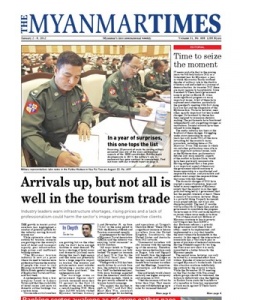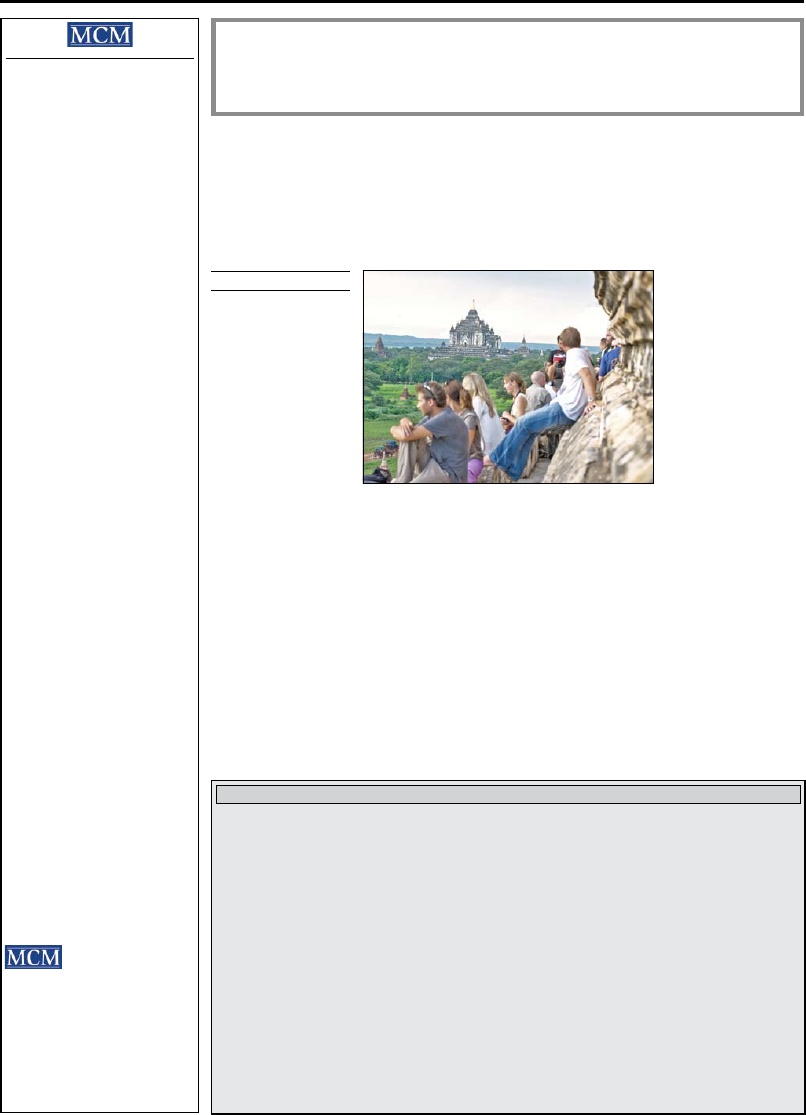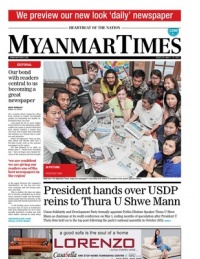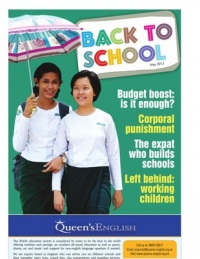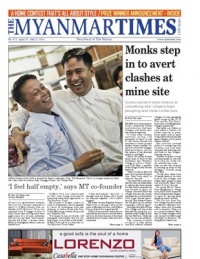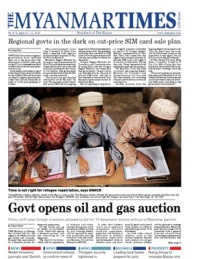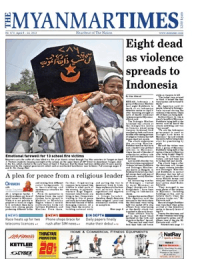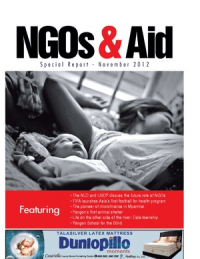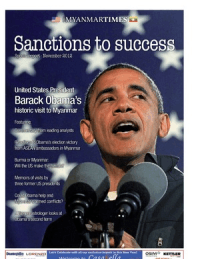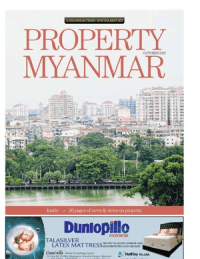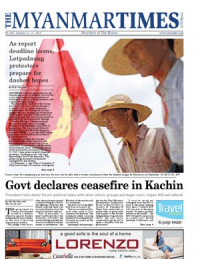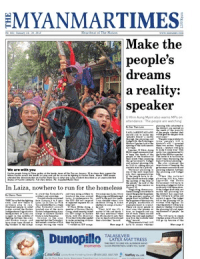myanmar
times
t H e
January 2 - 8, 2012
Myanmar’s first international weekly Volume 31, No. 608 1200 Kyats
In a year of surprises,this one tops the list
Reserving 25 percent of seats for serving militarypersonnel was one of the more controversialaspects of the 2008 constitution. But like manydevelopments in 2011, the military’s role inparliament has gone contrary to expectations. Findout more with our in-depth report on page 3.
THE growth in tourist arrivalnumbers has highlighted anumber of potential pitfalls forthe industry moving forward,sources say.While optimistic about theoutlook for tourism, concernsare growing over the country’slack of hotel and transportcapacity, poor infrastructure,high prices and inefficientbooking systems.“The Myanmar tourismindustry is now at a pointwhere we need to become moreprofessional because the numberof people who want to visitMyanmar is slowly growing,” MrEdwin Briels, general managerof Exploration Travel and Tour,said last week. A spokesperson from a tourcompany based in SakuraTower said that the availabilityof hotel rooms and seats ondomestic airline bookings wasa serious issue.“On one side arrival numbersare growing but on the otherside we don’t have enoughfacilities to meet demand. Wehave a shortage of hotel roomsand domestic [airline] seatsduring this year’s high seasonand this issue can potentiallyhave a huge negative impacton tourism. The ministry andprivate sectors must considerdeveloping a master plan tosolve these problems,” thespokesperson said.The warnings come asgovernment figures showarrivals increased more than26 percent in the first 11months of the year, followinga record-breaking 2010. Morethan 343,000 tourists visitedMyanmar between January1 and November 30, up from271,547 in the same period in2010, the Ministry of Hotels andTourism announced recently. A spokesperson for the Unionof Myanmar Travel Association(UMTA) said the industry wasenjoying “solid increases” intourist numbers.“All major hotels in Yangonand key destinations are fullybooked. We expect an increaseof at least 20 to 25pc for the2011-2012 fiscal year,” thespokesperson said.While growth in 2011 has beenmostly driven by arrivals from Asia, the industry is preparingfor a “shift” in clientele next year,with more bookings expectedfrom the American, Australianand British markets, which inthe past mostly adhered to thetourism boycott campaign.“We expect the market toshift in 2012,” said Daw MayMyat Mon Win, assistantgeneral manager for marketingand operations at Yangon’sChatrium Hotel. “There will bea significant increase in leisuretravellers from the UnitedKingdom, Scandinavia, theUnited States and Australiafrom 2012 onwards.“Commercial travellers willalso increase with the openingup of the economy. Therefore,major leisure destinations suchas Bagan, Inle and Ngapaliwill benefit from the high-endleisure market, and Yangon asthe key commercial hub willbenefit from business travellersand the Meetings, Incentives,Conventions, and Exhibitionsbusiness.”She said hotels would almostcertainly see higher occupancyand revenues in 2012.“I feel the increase will not belower than 25pc. That meansthe rates will definitely go up tocater for increased demand.”
Industry leaders warn inrastructure shortages, rising prices and a lack oproessionalism could harm the sector’s image among prospective clients
Arrivals up, but not all iswell in the tourism trade
IT seems probable that in the comingyears we will look back on 2011 as awatershed year for Myanmar, a yearin which the country finally confineddecades of military rule to the dustbinof history and embarked on a journey of democratisation. As we enter 2012 thereare many reasons to be optimistic. SincePresident U Thein Sein’s governmentcame to power on March 30, it hasmade significant progress on manyimportant issues. A few of these havecaptured most attention, particularlythe president’s meeting with Daw AungSan Suu Kyi and the suspension of theMyitsone dam. We have, however, seenother, equally important but less laudedchanges. Government by decree hasbeen replaced by consensus-decisionmaking. The parliaments have functionedindependently and are getting stronger asinstitutions. Societal controls have beenrelaxed to some degree.The media industry has been at theforefront of these changes. Strugglingunder strict censorship for manyyears has only made 2011 all the morerewarding for the country’s many journalists, including those at
The Myanmar Times
. The manner in whichwe and other publications were able tocover important national issues, suchas the Myitsone dam, parliamentarydebates and, more recently, aspectsof the conflict in Kachin State, wouldhave been previously inconceivable.Having recognised that a free pressis an important aspect of democracy,the government should continue toloosen censorship in a coordinated andresponsible manner, and journalists andeditors must accept the responsibilitiesthat come with this freedom.The dramatic changes of 2011 havecreated a sense of optimism, hope andbelief in many segments of Myanmarsociety that the country is on the rightpath and being led by a government thathas the people’s interests at heart. Thereis reason to be cautious, however. Hopeis a powerful thing. Properly harnessed,it can propel reforms, yet it can alsodissipate quickly. The next 12 monthswill be critical for U Thein Sein and hisgovernment to consolidate the progresswe have seen in 2011 and make headwayon issues where more needs to be done.Two of these stand out. Millions of Myanmar continue to live in poverty,surviving on less than K1000 aday. Economic reforms – a priority,the government said when it tookoffice – need to be implemented, andimplemented in a way that benefitsthe most vulnerable households in thecountry. In this regard, the internationalcommunity has a vital role to play interms of provision of technical assistance.Having withheld support for too long,the West must now show it is reallycommitted to a better future for theMyanmar people.The second issue, however, can onlybe solved by a concerted effort fromwithin. Decades of internal conflict haveravaged Myanmar’s borderlands. Shouldthis situation continue indefinitely,the outlook for the country is bleak.While the November 19-20 meetingon the Thai border with five armedethnic groups should be welcomed, thefailure to definitively stop the fightingin Kachin State since the breakdownof a ceasefire in June has representeda black mark against U Thein Sein’sgovernment.
Time to seizethe moment
EDITORIAL
Military representatives take notes in the Pyithu Hluttaw in Nay Pyi Taw on August 22.
Pic: AFP
More page 4More page 4
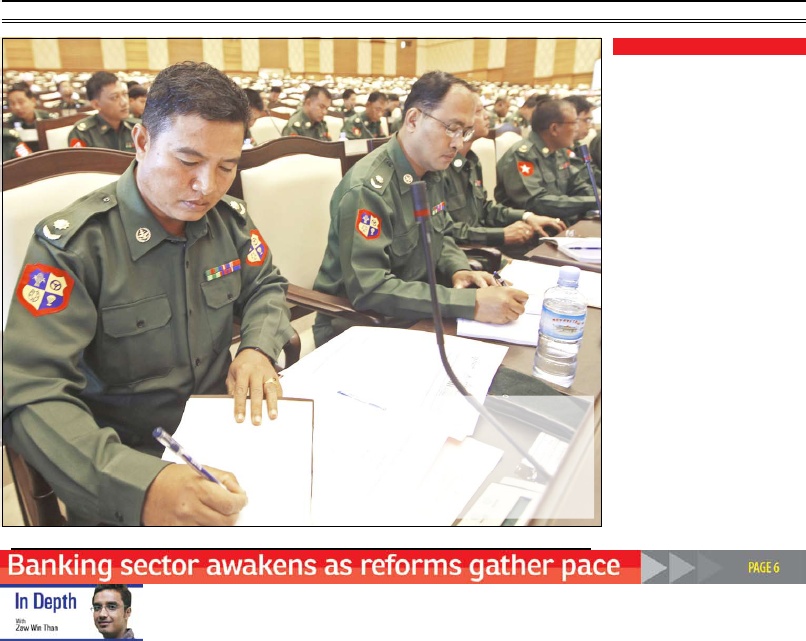


N
ews
the
M
yanMar
t
iMes
2
January 2 - 8, 2012
DR Feelgood, a Britishblues rock band, neverapproached the fame of theBeatles or the Stones oreven the Kinks, but theywere mesmeric performerswho had a great rapportwith pub crowds inLondon’s East End. Among the band’s morememorable numbers was“The Feelgood Factor”, asong about a woman whopossessed that quality. Itschorus goes like this:She got what you wantShe got what you needIt’s the feelgood factorand it’s guaranteedThe lyrics came tomind last month when Yingluck Shinawatra,the Thai Prime Minister,attended a sumptuouslycolourful garden partymarking King Bhumibol Adulyadej’s 84
th
birthday.Without doubt, Yingluckhas got the feelgood factor. As she moved amongthe glittering throngof gowned ladies, bow-tied men, uniformedofficers, diplomats andbureaucrats, as well assome plain folks and lowly journalists, she was like acelestial magnet.Everyone, includingsenior members of thecabinet and normallyaugust ambassadors,pressed towards her, eagerto exchange a few wordsand have their photographtaken with her.What was most strikingwas that she never misseda beat, never let theradiant smile drop, neverfailed to return a preferred
wai
or a friendly greeting.Despite her relativepolitical inexperience, Yingluck, 44, appears tothe manor born and itlooks likely that whilesome under-performingministers may soon fallby the wayside, she’sdefinitely in for the longhaul.The feelgood factor,which radiates from her,has spread over Thailandand swamped the cynicismand despair caused bythe relentless civil unrestand social polarisationthat resulted from thedisastrous military coup of 2006. And despite recentlethal floods of biblicalproportions, there isnow a sense of relief andcalmness, accompaniedby a conviction that hergovernment will last, andthat while it may have upsand downs, it will not doanything crazy.What accounts for Yingluck’s incrediblefeelgood factor? Well,for starters, the Thaksinfactor can be dismissed asthe major reason for it. Yes, earlier this year,her elder brother, formerPrime Minister ThaksinShinawatra, did pick herto lead the Pheu ThaiParty that would representhis interests in the July 3election. And yes, his name andfunds and political acumendid help propel her tovictory in those polls.But it’s one thing to getthat kind of backing, it’squite another to capitaliseon it and leave youropponents in the dust,and then, having won in alandslide, to hold down thepost of prime minister andretain popular support.Perhaps we should notbe so surprised. After all,aside from the feelgoodfactor, Yingluck, whoearned a master’s degreein the United Statesand is a former companymanaging director, isknown to be savvy andself-assured. A well-connectedbusiness consultant, whohas been in Thailand fordecades and is not easilyimpressed, recalled thatwhen he invited Yingluckto seminars, she “alwaysparticipated and asked thebest questions”.She has alreadyacquired the politicalknack of avoiding blameand is now referred to inthe local media as “theTeflon Lady”.In a poll earlier lastmonth, three timesmore people blamed theopposition Democratsfor causing the floodsthan blamed Yingluck’sgovernment, and twiceas many blamed theDemocrat-aligned Bangkokgovernor.In fact, the opposition,led by former PM Abhisit Vejjajiva, has performeddismally and appearsunable to offer much inthe way of constructivecriticism aside from ritualand increasingly boringanti-Thaksin jibes. As one ambassador saidat the King’s birthdaygala: “Who cares aboutthat? If any Thais do,it’s because they wantThaksin back. So harpingon about it is a lose-losetactic for the Democrats.”He’s right. Meantime, Yingluck’s popularitycontinues to rise. A recentpoll gave her a 68 percentpositive rating. As the songsays: She got the feelgoodfactor and it’s guaranteed.
Yingluck and thefeelgood factor
MANDALAY residents have alwaysbeen at pains to point out that theydo things differently than those inother parts of the country. And whenit comes to politics, the same appearsto be true.While Nay Pyi Taw and Yangonhave been a hive of political activityover the past seven or eight months,Mandalay has been relatively quiet.But residents are keen to stress thatnot all is as it seems in Myanmar’ssecond largest city.“Mandalay and Yangon are verydifferent in everything. It’s like thedifference between the countrysideand the city,” said Ko Sanyu Kyaw, alocal journalist.“There are just a few politicians inMandalay and they cannot mobiliselike the Yangon-based politicians,”he said. “But we have many socialassociations in Mandalay and theycan perform better than politicalparties.”Ko Sanyu Kyaw added that he hadn’tseen any “prominent” political changesin Mandalay since the governmentcame to power in late March.For outspoken lawyer and politicianU Sein Hla, who unsuccessfully stoodas an independent candidate in the2010 election, the new governmenthas a mixed record. “I like PresidentU Thein Sein but I’m not happy with[the government’s] policies,” he said.“We welcome the president’s speechtalking about good governance andclean government but we will have towait and see how clean it really is.”While he commends U Ye Myint, thechief minister of Mandalay Region, forhis efforts to keep discipline amongcivil servants, U Sein Hla said hethinks lower-ranking civil servanthave not changed their behaviour.He also complained that few of thecandidates that contested the electionin 2010 had remained politicallyactive, and those that had seemedunable to build a support base.“They can’t work practically. Weneed stronger politicians and improvedperformance. It is very important thatparties don’t have unworthy politiciansin their ranks,” he said.Perhaps another explanation is thatMandalay Region voters plumpedoverwhelmingly for the UnionSolidarity and Development Party(USDP) in the November 2010 poll.The party won all Amyotha Hluttawand Pyithu Hluttaw seats in theregion, and all but two of the 57 electedrepresentatives in the MandalayRegion Hluttaw are from the USDP.However, recently there has beensome movement among oppositionpolitical parties in the city. At agathering on October 30, politicalleaders from six parties agreed toform what they called a Joint ActionCommittee (JAC), essentially across-party alliance. Members of the committee will meet on the lastSunday of each month to discusspolitical issues of importance.But most of Mandalay’s residentsbelieve political changes have hada limited impact, and that cleangovernment in particular is a longway off.“We have seen some changes inthe regional government such as theminister contacting private journalsdirectly. This is a sign of change,”said cartoonist Hergule (Katha). “Butone thing we’re unhappy about is thatlower-level members of governmentbodies seem to lack awareness of thechanges.”This reflects broader public sentimentthat while the government has beenclear in its intentions, improvementsare slow to materialise.“We see some clear politicalchanges but not from the bottom of the government … most staff are notkeeping up with the changes. Peoplewant to see a lot of changes. Everyoneis really interested in the politicalmovement and the country’s transitionprocess,” said Ko Nyein Chan, aMandalay resident.In an important step, reporterswere given access to the MandalayRegion Hluttaw for the first time inNovember, allowing them to betterreport on issues concerning theregional government.Unsurprisingly, U Ye Myint spun apositive line. He said at the hluttawmeeting in Mandalay on November2 that the regional governmentwas maintaining discipline amonggovernment staff and that ministerswere venturing out to the field for ruraldevelopment tasks. He added thatregional government was cooperatingwith the central government in Nay PyiTaw on legislation and developmenttasks concerning Mandalay Region andthat the regional government has toldstaff on city development committeesto improve public awareness of effortsto fight corruption.Whether Mandalay residents agreewith U Ye Myint, Dr Madan MohanSethi, the Indian consul generalin Mandalay, said the creation of a regional governments had madecommunication on sub-national issueseasier.“Now it is much better … becauseI can meet at least nine ministers inthe new [regional] government. Beforewe could only meet one [military]commander,” Dr Sethi said. “And Ifeel like we now have more freedom tospeak during these meetings.”
Mandalay marches to adifferent political beat
Clockwise from top: Members of the 88 Generation Student Youths (Union of Myanmar) conduct campaignactivities in Mandalay in mid-2010. Union Solidarity and Development Party members at the opening of the party’sMandalay headquarters on August 20, 2010. A Union Election Commission voting demonstration in September2010.
Pics: Christopher Davy, Hein Latt Aung
‘
The feelgoodfactor has spreadover Thailandand swampedthe cynicism anddespair causedby the civilunrest and socialpolarisation thatresulted fromthe militarycoup of 2006.
’
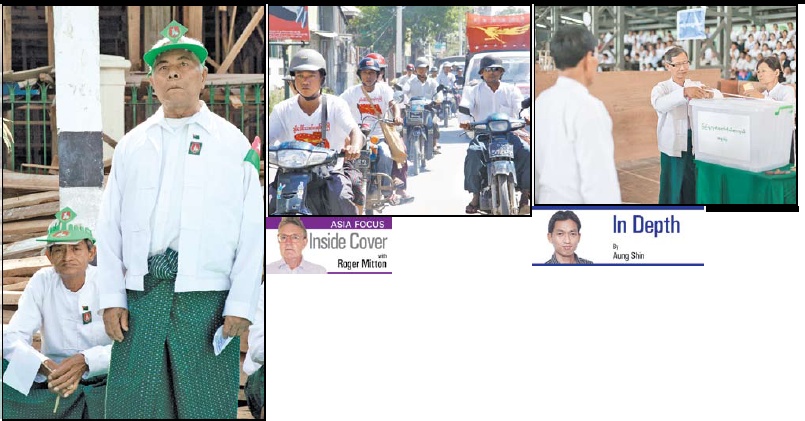







N
ews
3
the
M
yanMar
t
iMes
January 2 - 8, 2012
IT was one of the mostcontentious aspects of theconstitution: reserving25 percent of seats forserving military personnel.But despite some initialmistrust, elected andmilitary representativessay relations are improvingbetween the two groupsand, after a slow start, theserving military personnelare learning the ropes of lifein the hluttaw.“It is fine, there’s noproblem between militaryand civil representatives –no atmosphere of tension.We are becoming familiarwith each other,” said U SaiThan Nai, a Pyithu Hluttawrepresentative from ShanState.“We can even seediscussions on the sidelines[of parliament] amongcivilian and militaryrepresentatives on issuesthat they share a commoninterest in,” said U ThanNyein, a former member of National Democratic Forceand now an independentPyithu Hluttawrepresentative.Colonel Zaw Min Maung,a military representative inthe Yangon Region Hluttaw,said there was also a cordialrelationship in the regionalbody.“The atmosphere is fine,no tension between us at all.We are all thinking aboutthe good of our country,”he said.The provision to give themilitary a formal role inthe parliamentary systemdeveloped during theNational Convention, whichwas called to draft a newconstitution in 1993, fiveyears after demonstratorsacross the country called foran end to socialism in favourof a liberal democraticsystem.Some invited groups,including the NationalLeague for Democracy(NLD), boycotted theNational Conventionprimarily over the issue of the military having a formalpresence in parliament. Itremained a major concernfor the party when seniormembers decided not tocontest the 2010 election.However, it was seenas a concession to moreconservative elements in themilitary who worried thattransitioning to Western-style democracy, withparliaments comprisingonly elected representatives,would lead to instability.Military representativesoccupy 110 seats in the440-seat Pyithu Hluttaw,56 out of 224 seats in the Amyotha Hluttaw and morethan 200 seats in the 14state and regionhluttaws. They wereappointed by thethen-commander inchief, Senior GeneralThan Shwe.In the lead up tothe convening of the first session of parliament in Nay Pyi Taw onJanuary 31, there was muchspeculation among electedrepresentatives about whatrole the appointed militarypersonnel would play: Wouldthey try to hinder attemptsat reform? Would they beable to work independently?Would they vote as a bloc?Ten months on,representatives say thatthe military personnelface few restrictionswhen participating inparliamentary discussionsor voting on bills andproposals.“There are no instructionsfor discussions and voting.We decide ourselves,”confirmed Colonel Zaw MinMaung. “We have studiedpolitical subjects at theDefence Services Academy,”he said, referring to theexclusive officer trainingschool in Pyin Oo Lwin. Additionally, militaryrepresentatives underwenta five-day training programbefore starting theirassignment to parliamentson January 26 engagingwith legitimacy duties.“The main duty formilitary representatives isto uphold our three nationalcauses: non-disintegrationof the union, maintainingnational solidarityand perpetuating thesovereignty of the state,”Col Zaw Min Maung said.Military representativesare able to receive theirprevious salary or accept thesalary of a parliamentarian,which is K300,000 a monthfor those in the nationallegislatures and K200,000a month in regionallegislatures.“I chose my original salaryfrom the military. There’snot much of a differencebetween the two, though,”he said.While the number of military appointees inparliaments is legislated,there are no rules concerningmilitary representation onparliamentary committees.Representatives saidcommittees had beenestablished with “suitablepeople”, regardless of theirbackground, and comprisedmostly civilians.Journalists assignedto cover parliamentarysessions have been givena rare insight into theworkings of parliament.Like the parliamentarians,several said militaryrepresentatives appearedto vote and discuss issuesfreely, without having tofollow the instructions of asuperior.“At the first session of parliament, the militaryrepresentatives wereapparently unused to theparliamentary procedures.But in the second sessiontheir participation hasbeen increasing and Ihave noticed they preparethemselves for discussionsby reading legal texts andso on. They also participatein discussions on proposals,”said a journalist coveringthe Pyithu Hluttaw.But some said thepractices of the military hadfollowed the representativesto parliament.“They seem tolook at their seniorofficers beforedeciding how tovote. Sometimes wecan see they lookconfused as to howthey should vote,”said a journalist who hasobserved the AmyothaHluttaw.Their ability to participatefreely in parliamentarydebates and decisions wasrecently illustrated in therow over a controversialdecision made by thePyidaungsu Hluttawspeaker U Khin Aung Myint.On that occasion, all PyithuHluttaw representatives– civilian and military –objected to his decision,while all Amyotha Hluttawrepresentatives expressedtheir formal support for it.“I asked a militaryrepresentative [in the Amyotha Hluttaw], howcome? Why didn’t you allhave the same stance [onthat issue]? He replied, ‘Ialso have no idea about[why the decisions weredifferent],” said U PhoneMyint Aung, an AmyothaHluttaw representative.It can also be seen intelevision broadcasts of hluttaw sessions that themilitary representativesdo not always votetogether, contrary to initialexpectations. However, onenotable issue did manageto gain the support of allmilitary personnel in thePyithu Hluttaw: a proposalfor a general amnesty.Submitted by U TheinNyunt, the representativefor Thingangyun, in late August, the proposalreceived unanimous supportfrom both civilian andmilitary representatives,to the surprise of manyobservers.The question is whetherthis bipartisanship andability to operate freely willcontinue. U Phone Myint Aung said he concluded fromthe recent row between thetwo houses that the presenceof military representativescould improve trust betweenthe parliament and themilitary, which has been thedominant institution in thecountry for decades.“If militaryrepresentatives were not inparliament, there would bemore speculation and doubtbetween the parliamentsand military when disputeslike this occur,” he said.Dr Aye Maung, an AmyothaHluttaw representative fromRakhine State, said whilerelations between militaryand civilian representativeswere “generally good” therewere still concerns that themilitary personnel were notindependent.“There’s no particularsource of problems betweeneach of us,” he said. “[But] Iwould like to have a secretvoting system in order toallow them to vote evenmore independently.”
In the hluttaws, more green shoots
By Yamon Phu Thit
TELEPHONE hotlinesthat allow young people toanonymously ask questionsabout reproductive healthhave been establishedas part of the MyanmarMedical Association’s YouthDevelopment Program, aspokesperson said lastweek.The lines are manned byspecially trained doctorsfrom 10am to 5pm dailyand young people are ableto ask questions abouttopics such as HIV/AIDSand reproductive health. A “White Line” has beenestablished for men, whilewomen are encouraged tocall the “Pink Line”. A spokesperson fromthe Youth DevelopmentProgram said it openedthe hotlines last monthbecause young people wereoften too embarrassedto ask questions aboutreproductive health duringa face-to-face consultation.“Young people don’treceive the right informationif they aren’t able to ask forit openly,” Dr Aung PaingKhant said.While callers can remainanonymous, they arerequired to give their ageand township. “It will makeit easier for us to refer themto clinics if we know theiraddress,” he said. “Anyonecan use the hotline freelybut abusive language willnot be tolerated.”The White Line can bereached on 09-7321-2226and the Pink Line 09-7321-2227.
MMA launches twoyouth health hotlines
Above left: Military representatives in the Pyithu Hluttaw on August 22, the rst day of the second session. Above
right: President U Thein Sein addresses the Pyidaungsu Hluttaw earlier the same day.
Pics: Soe Than Lynn, AFP
By Aye Sapay Phyu
A GROUP of Swiss tourists will visitin late January for a hot-air balloontour of the country, said U Tint Naung,managing director of Golden ExpressTravel and Tours.The group has visited each year since1999. This year the balloonist will take tothe skies over Inle, Mandalay, Pakokkuand Bagan, U Tint Naung said.“They will arrive in Yangon onJanuary 28 and leave on February 11.They will go to Inle first – they likethat place very much. They will thentravel to Mandalay and Pakokku, andthen Bagan will be last destination.Those places are convenient for flying,”he said. “About 30 people will bein their group with a total of sevenballoons.”He said the group includes twoparachutists, who plan to jump in Inle,Mandalay and Bagan.In previous years the group hasparticipated in the Kachin ManawFestival in Myitkyina and KayahState Day in Loikaw.“But these areas are difficult toaccess and often you need to apply forpermission to travel there, so they arenot eager to go there again,” he said.Other previous destinations includeMonywa, Bago, Taunggyi, Pindayaand Mrauk-U.
Balloon enthusiasts to return this month
‘
We can even see discussions in parliamentbetween civilian and military representatives onissues they share a common interest in.
’
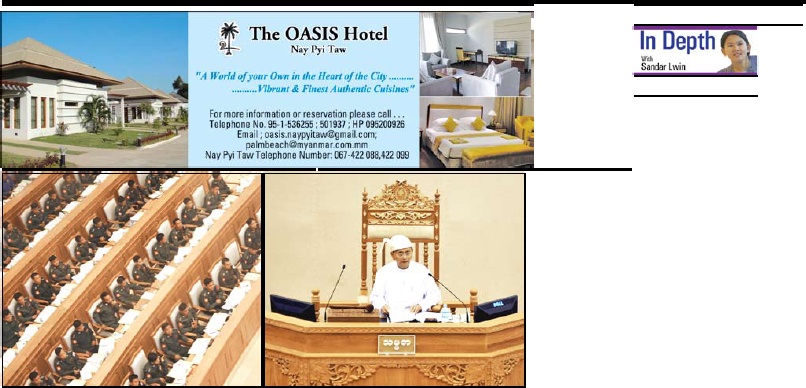








検索履歴:
結果00中00
00結果次の結果
p.
Notes
Post Note
